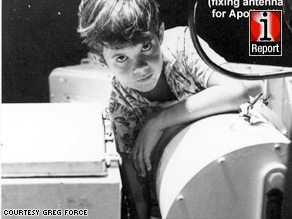-----------------------------------------------------------
2 legs, 4 legs
A remark that one of my friends made years ago stuck to my mind. His theory was that children are made cute because this makes it easier for their parents to keep their cool whenever the little ones act like brats. If they weren't cute, he says, they'd probably be thrown out the window or something equally horrible by their parents in a fit of "temporary insanity," which may be diffused once the concerned mom or dad catches sight of the pudgy toddler.
I've often wondered if puppies were made cute for the same reason (the "parent" in this scenario not  being the canine mom or dad but the human owner). After all, when the little pooch chews your new shoes to beyond thrift-shop condition, or keeps doing its bathroom business on the carpet, you can hit the roof and consider torture as a form of canine discipline. But once it looks at you with those droopy eyes and then scampers off as fast as those tiny legs can do it, of course you can almost feel your heart turning to jelly.
being the canine mom or dad but the human owner). After all, when the little pooch chews your new shoes to beyond thrift-shop condition, or keeps doing its bathroom business on the carpet, you can hit the roof and consider torture as a form of canine discipline. But once it looks at you with those droopy eyes and then scampers off as fast as those tiny legs can do it, of course you can almost feel your heart turning to jelly.
This same jelly transformation happened to me recently -- not on account of my dog, Sabrina, itself the most adorable creature on four legs in our household. I needed only to review the photos I'd accumulated in my computer, photos of these canine cuties. All in all, I had 12 -- it would've been more had I not trashed the others I used to keep. By the way, if you've been passing by my blog in the past several months, you may have seen some of them. I even realized that several of Norman Rockwell's illustrations have cute dogs in them! And, all the
four legs in our household. I needed only to review the photos I'd accumulated in my computer, photos of these canine cuties. All in all, I had 12 -- it would've been more had I not trashed the others I used to keep. By the way, if you've been passing by my blog in the past several months, you may have seen some of them. I even realized that several of Norman Rockwell's illustrations have cute dogs in them! And, all the  image-boosting for dogs/puppies (especially Beagles) can probably be attributed partly to Charles Schulz. Years of seeing Snoopy can do that...
image-boosting for dogs/puppies (especially Beagles) can probably be attributed partly to Charles Schulz. Years of seeing Snoopy can do that...
By the way, I saw a photo of two pampered little dogs from the Neiman Marcus online catalog (featuring limited edition pet homes). To be clear, I don't go for treating animals like humans and splurging on their care, even if one has tons of money. And I believe in inequality 100% when it comes to comparing animals and humans. Concern for animal welfare and respecting the innate dignity of human beings are perfectly compatible. Still, this is a cute picture so I decided to put it here. =)
to comparing animals and humans. Concern for animal welfare and respecting the innate dignity of human beings are perfectly compatible. Still, this is a cute picture so I decided to put it here. =)
Looking at the canine pictures then reminded me of an entry I posted in my other blog last year about dogs and people. Here it is:
It's hardly surprising that a preschooler who has been spending his whole life (all 4 or 5 long years of it) around the family dog would assume that canines andhumans are on the exact same level as far as the hierarchy of creatures is concerned.
Keeping a family dog does have benefits in that it provides occasions for play in the home as well as opportunities to teach kids about responsibility. Also, having a pet around is a good way to demonstrate to a child what he is and what he is not ("we drink our milk from the glass, we don't lap it up from a bowl like Pepper does"). Another thing you can tell kids when they're behaving more like four-legged creatures is that for humans, there is such a thing as manners. Dogs can be taught tricks; persons learn manners and what these are for.
You can learn a thing or two, if you please, by checking out the following -- from the book Talk to the Hand by Lynne Truss :
Manners are about showing consideration, and using empathy. But they are also about being connected to the common good; they are about being better. Every time a person says to himself, “What would the world be like if everyone did this?” or “I’m not going to calculate the cost to me on this occasion. I’m just going to do the right thing”, or “Someone seems to need this seat more than I do ”, the world becomes a better place. It is ennobled. The crying shame about modern rudeness is that it’s such a terrible missed opportunity for a different kind of manners — manners based, for the first time, not on class and snobbery, but on a kind of voluntary charity that dignifies both the giver and the receiver by being a system of mutual, civil respect.
And what's more...
Being friendly and familiar with strangers is not the same as being polite (as we have seen), but if it helps us to overcome our normal reticence, all right, be friendly. Yes, we live in an aggressive “Talk to the hand” world. Yes, we are systematically alienated and have no sense of community. Yes, we swear a lot more than we used to, and we prefer to be inside our own individual Bart Simpson bubbles. But just because these are the conditions that promote rudeness does not mean that we can’t choose to improve our happiness by deciding to be polite to one another.
You can read the article, Don't be so rude, at Times Online.
Okay, a couple of more photos I have in my pc, in case you'd like to see them --






